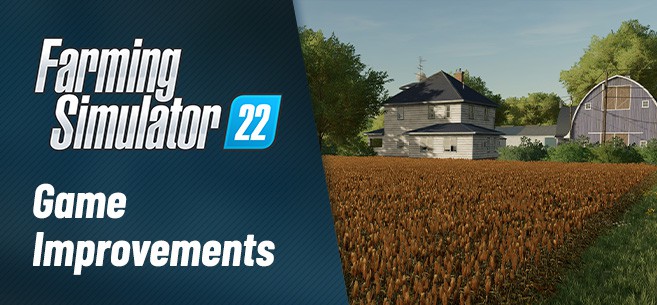Better sorghum and graphics in FS22






Better sorghum and graphics in FS22
Choo-choo – do you hear that? Oh boy, it’s the good-news-train, entering the railway station to unload some exciting announcements: Farming Simulator 22 is at the finishing line of development before it releases next month. But, that’s not the motherload of today’s news.
As you provided us with feedback over the last couple of weeks and months in response to our announcements and footage, our attentive community department steadily talked to our busy developers to implement various adjustments and improvements to the game.
Here are some changes we made in the last couple of weeks. Good thing, a month consists of at least 28 days, right? RIGHT? Yeah…
Changes to the seasonal length

When we first introduced seasonal cycles coming to Farming Simulator 22, a virtual year was supposed to consist of twelve days. Meaning, each day in-game would be the equivalent of a month. Our goal was, and still is, to find a balance of challenging and relaxing gameplay-mechanics that work for as many players as possible, regardless of their experience.
For a lot of you… seasoned farmers, the duration of a year wasn’t as appealing as we hoped, even though players will be able to decrease the speed of time in-game even further than before. The challenge we were now facing was to implement the option to customize the length of the seasons. Why is that a challenge?
In game development, there is a massive amount of dependencies with even the tiniest change. It’s literally the risk of a butterfly effect that sticks to everything. That’s especially true for seasonal length connected to various affected gameplay-mechanics that might break and need to be compatible – as we can’t release a game with potential errors produced by our mechanics that, in the worst case, corrupts save games.
Long story short: Longer seasons. You can increase the length of a month up to 28 days. Yes, each MONTH can consist of 28 days. Changes take effect after the current season is completed.
Changes to the graphics

While gameplay programmers focus on gameplay mechanics and work on the gameplay side during the whole course of development, our tech guys do the same on their end. Meaning, the graphics still evolve between showing the first screenshot or trailer and the release of the game. Of course, we also take your feedback under consideration until the last pixel is considered final.
Between the months-old game build we’ve shown at gamescom, for example, and the version we’re going to release in a few weeks, a lot of graphical aspects, and therefore the visual appearance, have changed. We got a lot of feedback on the aesthetics of Farming Simulator 22, and incorporated some changes while working on already planned improvements.
We improved the level of detail of foliage to guarantee more beautiful transitions between colors. We fine-tuned Screen Space Ambient Occlusion (SSAO) to create more natural shadows – resulting in more natural-looking surroundings. And, we modified the color grading to achieve an overall, more realistic and atmospheric feel.
Long story short: Improved various graphical aspects, looks nice.
Better sorghum

Sorghum, or milo, is an important crop, becoming even more important in recent years, in warm climates. That’s why it’s considered a welcome addition by our American players and a predestined crop to sow on our US-Midwestern map, Elmcreek. Of course, our more Mediterranean-inspired map Haut-Beyleron also benefits from having sorghum available to grow. As our sorghum farmers all around the world noticed, the process of harvesting sorghum wasn’t quite accurate in the early version of Farming Simulator 22.
Long straw cut short: Only the top of the fruit gets cut off when harvesting, now.
We hope you like our recent changes to Farming Simulator 22. Thank you for your feedback! We also hope you are as excited about the launch in a couple of weeks as we are. Also, there’s more news coming up. Stay tuned!
Credits:Farming Simulator 22



